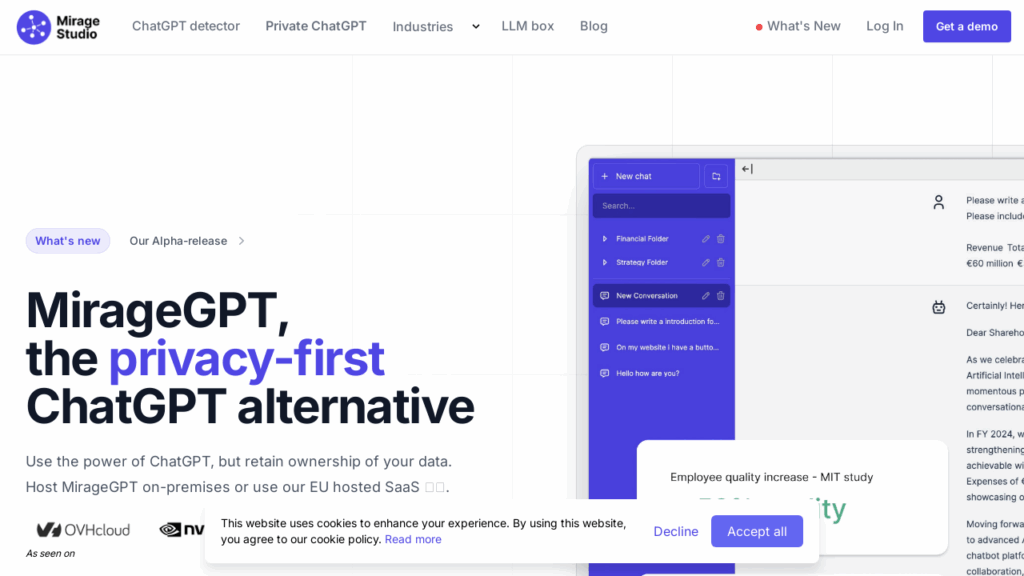In an era where AI has transformed business operations, data privacy concerns have escalated proportionally. Businesses looking to leverage AI capabilities without compromising sensitive information face a significant challenge. Enter MirageGPT by Mirage Studio, a privacy-first ChatGPT alternative designed specifically for organizations seeking advanced AI functionalities while maintaining complete data sovereignty. This technical review explores the platform’s capabilities, security features, deployment options, and how it stacks up against competing private AI solutions in today’s market.
As organizations increasingly adopt AI tools for various business processes, many have encountered a troubling reality: using third-party AI platforms like OpenAI’s ChatGPT often means surrendering control of proprietary data. According to Mirage Studio’s website, “Every day, your trade secrets and sensitive data are being leaked by using third-party AIs like ChatGPT or Google Bard.” This concern is echoed by privacy experts like Mark McCreary, co-chair of privacy and data security practice at Fox Rothschild LLP, who stated to CNN that “The privacy considerations with something like ChatGPT cannot be overstated. It’s like a black box… I think the opportunity for company trade secrets to get dropped into these different various AI’s is just going to increase.”
MirageGPT distinguishes itself as a solution that enables businesses to retain 100% ownership of their data while still accessing powerful language model capabilities. The platform offers both cloud-based and on-premises deployment options, with particular emphasis on European data protection standards. This EU-based and hosted solution addresses GDPR compliance concerns that many international businesses face when implementing AI technologies.
The technical architecture of MirageGPT revolves around providing a secure, private environment for AI interactions. The platform is built on LLaMa 2, which according to Mirage Studio’s blog, features “over 2 trillion tokens and a context length of 4096,” potentially surpassing the capabilities of ChatGPT 3.5. This underlying model serves as the engine for MirageGPT’s natural language processing capabilities, enabling sophisticated text generation, question answering, and conversational AI features while keeping all data within the organization’s control.
One of MirageGPT’s standout features is its private knowledge base functionality. Users can upload internal documents in various formats including PDFs, Word documents, PowerPoint presentations, emails, and even entire websites. The system then processes and indexes this information, making it accessible through the conversational interface. This capability transforms MirageGPT from a general-purpose AI assistant into a specialized knowledge worker with access to organization-specific information—all without sharing confidential data with external parties.
The platform’s integration capabilities extend its functionality beyond a standalone chat interface. MirageGPT can connect with communication tools like Microsoft Teams, Slack, and Discord, allowing teams to interact with the AI directly from their existing collaboration environments. This seamless integration enhances workflow efficiency without disrupting established communication channels.
From a technical implementation perspective, Mirage Studio offers flexible deployment options to accommodate various security requirements. The Business Cloud plan hosts MirageGPT on Europe’s leading cloud provider, ensuring data residency within the EU. For organizations with stricter security protocols, the Enterprise Cloud plan provides a private cloud environment, while the Enterprise On-premises option allows for complete self-hosting on the organization’s infrastructure. The recently introduced “MirageGPT in a box” offers an all-in-one hardware package for organizations seeking a turnkey on-premises solution.
When comparing MirageGPT to other private AI solutions, several distinctions emerge. Unlike Claude by Anthropic, which offers impressive conversational abilities but still operates as a third-party service, MirageGPT provides full data isolation. Compared to open-source alternatives like locally deployed Llama 2 models, MirageGPT offers a more comprehensive ecosystem with knowledge base integration, enterprise support, and user-friendly interfaces that don’t require extensive technical expertise to implement.
Google’s Gemini, while powerful and integrated with Google Workspace, still presents similar data privacy concerns as ChatGPT for sensitive business information. Microsoft Copilot, though deeply integrated with Microsoft 365, also operates as a cloud service that processes data externally. MirageGPT’s focus on complete data ownership and privacy-by-design principles represents a fundamentally different approach to enterprise AI deployment.
The user experience of MirageGPT balances sophistication with accessibility. The platform features a chat-like interface familiar to users of consumer AI tools, making adoption straightforward for employees across technical skill levels. The administrative features provide granular control over user permissions, knowledge base access, and usage analytics—critical capabilities for enterprise deployment.
From a performance perspective, MirageGPT leverages the capabilities of LLaMa 2 to deliver response quality comparable to leading consumer AI platforms. The context length of 4096 tokens allows for more comprehensive understanding of complex queries and document analysis compared to some earlier models. Response speed varies based on deployment configuration, with the Enterprise plans offering “Turbo+” response speeds for time-sensitive applications.
Security and compliance features form the cornerstone of MirageGPT’s value proposition. Beyond the fundamental privacy-by-design architecture, the platform incorporates end-to-end encryption, role-based access controls, and comprehensive audit logging. These features help organizations maintain compliance with regulations like GDPR and industry-specific requirements while leveraging advanced AI capabilities.
The pricing structure for MirageGPT reflects its enterprise focus. The Business Cloud plan starts at €99 per user per month (excluding VAT), providing access to a private business platform with a single knowledge database. The Enterprise Cloud and On-premises plans offer custom pricing based on specific organizational needs, with additional features like unlimited knowledge databases, advanced analytics, API access, and custom branding options.
Early adopters of MirageGPT include educational institutions like Hogeschool Utrecht and ROC Amsterdam, as well as businesses across various sectors. One testimonial from Gijs Kooij, CEO of ShopPros, highlights the privacy advantages: “Researching AI for e-commerce product data we came across MirageGPT with their private ChatGPT product. We wanted to have a solution for our customers that was secure in where data did not needed to be shared with other commercial parties. We’ve been really impressed with the model’s capabilities and the support MirageGPT offered.”
The leadership behind Mirage Studio brings relevant expertise to enterprise AI development. Co-founder and AI lead Daryl Autar brings experience as a former lead data scientist at Hallmark and Capgemini, with a background in compliance and data privacy for multinational medical companies. Co-founder Gijs Verdonschot contributes experience in building privacy-by-design software applications and has been recognized in TheNextWeb’s T500 as one of the 500 most talented under 30.
For organizations evaluating private AI solutions, MirageGPT offers several potential use cases beyond general-purpose assistance. These include private personal assistants with access to emails and calendars, legal consultation with awareness of company-specific sensitivities, business strategy development, internal documentation management, code assistance with proprietary codebases, and customer relationship management with integration of CRM data.
Looking at the competitive landscape for private enterprise AI solutions, MirageGPT occupies a specialized niche focused exclusively on data sovereignty and European compliance standards. While larger players like Microsoft and Google offer AI assistants integrated with their respective ecosystems, and specialized vendors like Jasper AI focus on content creation workflows, MirageGPT’s singular focus on privacy positions it uniquely for organizations where data security is the primary concern in AI adoption.
For IT decision-makers evaluating MirageGPT, the total cost of ownership extends beyond the subscription pricing. On-premises deployments require consideration of hardware requirements, maintenance overhead, and internal expertise. However, this investment may be justified for organizations handling particularly sensitive information or operating in highly regulated industries where data sovereignty is non-negotiable.
The implementation process for MirageGPT involves several steps, beginning with a demonstration to understand capabilities, followed by deployment configuration, knowledge base population, integration with existing systems, user training, and ongoing optimization. Mirage Studio offers support throughout this process, with specialized assistance for organizations with complex requirements or extensive internal documentation.
Frequently Asked Questions about MirageGPT
What makes MirageGPT different from standard ChatGPT for enterprise use?
MirageGPT is designed specifically for businesses concerned about data privacy, offering complete data ownership unlike standard ChatGPT which can use your data for model training. MirageGPT can be deployed in EU-based cloud environments or on your own servers, ensuring sensitive business information never leaves your control while still providing advanced AI capabilities comparable to ChatGPT.
How does MirageGPT’s underlying technology compare to other AI language models?
MirageGPT is powered by LLaMa 2, featuring over 2 trillion tokens and a context length of 4096, potentially outperforming ChatGPT 3.5 in certain applications. This robust foundation enables sophisticated text generation, document analysis, and conversational capabilities while maintaining complete data isolation within your organization’s infrastructure.
Can MirageGPT integrate with existing business communication tools?
Yes, MirageGPT offers powerful integration capabilities with platforms like Microsoft Teams, Slack, and Discord. This allows team members to interact with the AI directly from their existing collaboration tools, enhancing workflow efficiency without disrupting established communication channels.
What deployment options are available for MirageGPT?
MirageGPT offers three primary deployment options: Business Cloud (hosted on EU cloud providers), Enterprise Cloud (private cloud environment), and Enterprise On-premises (self-hosted on your infrastructure). Additionally, the “MirageGPT in a box” provides an all-in-one hardware package for organizations seeking a turnkey on-premises solution.
How does MirageGPT handle internal company knowledge and documentation?
MirageGPT features a private knowledge base that supports various document formats including PDFs, Word documents, PowerPoint presentations, emails, and even entire websites. The system processes and indexes this information, making it accessible through the conversational interface while maintaining complete data privacy.
What security measures does MirageGPT implement to protect sensitive data?
MirageGPT employs a privacy-by-design architecture with end-to-end encryption, role-based access controls, and comprehensive audit logging. The platform is designed with GDPR compliance in mind, with particular emphasis on European data protection standards for organizations handling sensitive information.
How does MirageGPT’s pricing compare to other enterprise AI solutions?
MirageGPT’s Business Cloud plan starts at €99 per user per month (excluding VAT), while Enterprise Cloud and On-premises plans offer custom pricing based on specific organizational requirements. While not the least expensive option compared to some consumer AI tools, the emphasis on data privacy and control provides value justification for organizations prioritizing these aspects.
What kinds of organizations are currently using MirageGPT?
MirageGPT has been adopted by various educational institutions including Hogeschool Utrecht and ROC Amsterdam, as well as businesses across different sectors concerned with data privacy. The platform is particularly relevant for organizations in regulated industries, those handling sensitive intellectual property, or companies subject to strict data sovereignty requirements.

